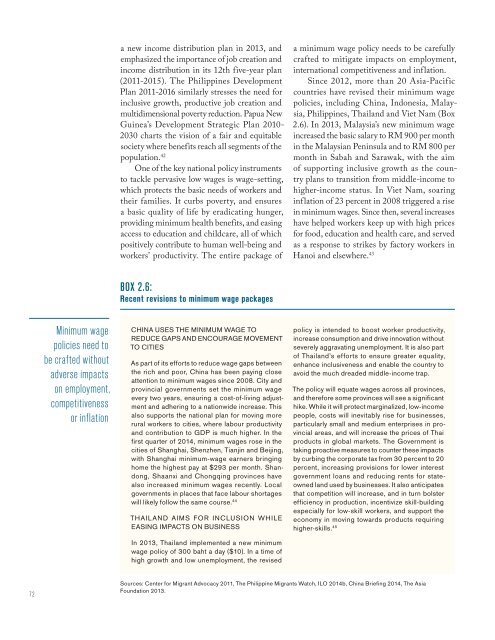SHAPING THE FUTURE HOW CHANGING DEMOGRAPHICS CAN POWER HUMAN DEVELOPMENT
1VPo4Vw
1VPo4Vw
You also want an ePaper? Increase the reach of your titles
YUMPU automatically turns print PDFs into web optimized ePapers that Google loves.
a new income distribution plan in 2013, and<br />
emphasized the importance of job creation and<br />
income distribution in its 12th five-year plan<br />
(2011-2015). The Philippines Development<br />
Plan 2011-2016 similarly stresses the need for<br />
inclusive growth, productive job creation and<br />
multidimensional poverty reduction. Papua New<br />
Guinea’s Development Strategic Plan 2010-<br />
2030 charts the vision of a fair and equitable<br />
society where benefits reach all segments of the<br />
population. 42<br />
One of the key national policy instruments<br />
to tackle pervasive low wages is wage-setting,<br />
which protects the basic needs of workers and<br />
their families. It curbs poverty, and ensures<br />
a basic quality of life by eradicating hunger,<br />
providing minimum health benefits, and easing<br />
access to education and childcare, all of which<br />
positively contribute to human well-being and<br />
workers’ productivity. The entire package of<br />
a minimum wage policy needs to be carefully<br />
crafted to mitigate impacts on employment,<br />
international competitiveness and inflation.<br />
Since 2012, more than 20 Asia-Pacific<br />
countries have revised their minimum wage<br />
policies, including China, Indonesia, Malaysia,<br />
Philippines, Thailand and Viet Nam (Box<br />
2.6). In 2013, Malaysia’s new minimum wage<br />
increased the basic salary to RM 900 per month<br />
in the Malaysian Peninsula and to RM 800 per<br />
month in Sabah and Sarawak, with the aim<br />
of supporting inclusive growth as the country<br />
plans to transition from middle-income to<br />
higher-income status. In Viet Nam, soaring<br />
inflation of 23 percent in 2008 triggered a rise<br />
in minimum wages. Since then, several increases<br />
have helped workers keep up with high prices<br />
for food, education and health care, and served<br />
as a response to strikes by factory workers in<br />
Hanoi and elsewhere. 43<br />
BOX 2.6:<br />
Recent revisions to minimum wage packages<br />
Minimum wage<br />
policies need to<br />
be crafted without<br />
adverse impacts<br />
on employment,<br />
competitiveness<br />
or inflation<br />
CHINA USES <strong>THE</strong> MINIMUM WAGE TO<br />
REDUCE GAPS AND ENCOURAGE MOVEMENT<br />
TO CITIES<br />
As part of its efforts to reduce wage gaps between<br />
the rich and poor, China has been paying close<br />
attention to minimum wages since 2008. City and<br />
provincial governments set the minimum wage<br />
every two years, ensuring a cost-of-living adjustment<br />
and adhering to a nationwide increase. This<br />
also supports the national plan for moving more<br />
rural workers to cities, where labour productivity<br />
and contribution to GDP is much higher. In the<br />
first quarter of 2014, minimum wages rose in the<br />
cities of Shanghai, Shenzhen, Tianjin and Beijing,<br />
with Shanghai minimum-wage earners bringing<br />
home the highest pay at $293 per month. Shandong,<br />
Shaanxi and Chongqing provinces have<br />
also increased minimum wages recently. Local<br />
governments in places that face labour shortages<br />
will likely follow the same course. 44<br />
THAILAND AIMS FOR INCLUSION WHILE<br />
EASING IMPACTS ON BUSINESS<br />
In 2013, Thailand implemented a new minimum<br />
wage policy of 300 baht a day ($10). In a time of<br />
high growth and low unemployment, the revised<br />
policy is intended to boost worker productivity,<br />
increase consumption and drive innovation without<br />
severely aggravating unemployment. It is also part<br />
of Thailand’s efforts to ensure greater equality,<br />
enhance inclusiveness and enable the country to<br />
avoid the much dreaded middle-income trap.<br />
The policy will equate wages across all provinces,<br />
and therefore some provinces will see a significant<br />
hike. While it will protect marginalized, low-income<br />
people, costs will inevitably rise for businesses,<br />
particularly small and medium enterprises in provincial<br />
areas, and will increase the prices of Thai<br />
products in global markets. The Government is<br />
taking proactive measures to counter these impacts<br />
by curbing the corporate tax from 30 percent to 20<br />
percent, increasing provisions for lower interest<br />
government loans and reducing rents for stateowned<br />
land used by businesses. It also anticipates<br />
that competition will increase, and in turn bolster<br />
efficiency in production, incentivize skill-building<br />
especially for low-skill workers, and support the<br />
economy in moving towards products requiring<br />
higher-skills. 45<br />
72<br />
Sources: Center for Migrant Advocacy 2011, The Philippine Migrants Watch, ILO 2014b, China Briefing 2014, The Asia<br />
Foundation 2013.


